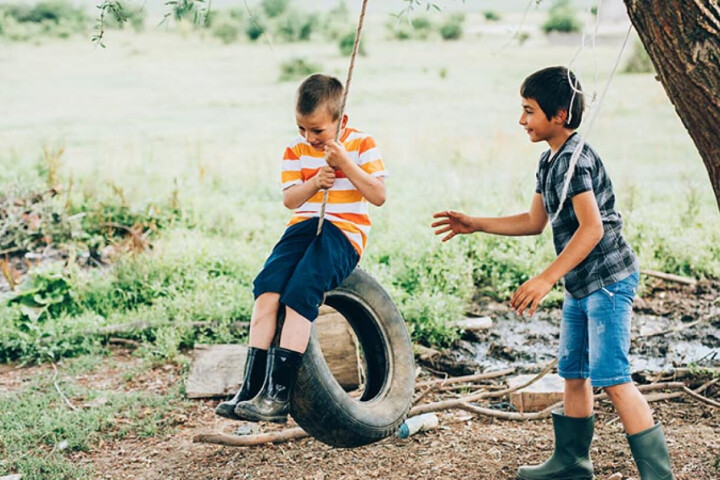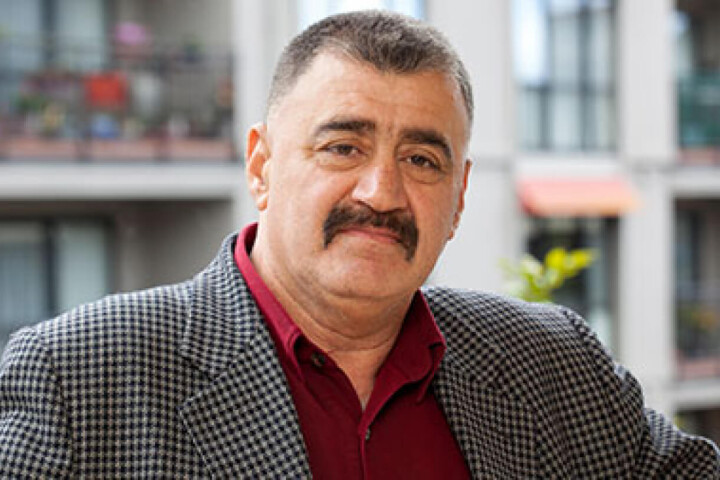We’ve helped children and families flourish
Every day we work with children and families to help them make positive, lasting changes. Read about some of our clients’ journeys.
Every day we work with children and families to help them make positive, lasting changes. Read about some of our clients’ journeys.

Katie* and Jordan’s* dad was 25 when he suddenly passed away. Their mum was unwell, and couldn’t manage the children on her own so grandma Helen* stepped in to take charge of her two grandchildren.
Both children had been struggling to come to terms with their mum’s ill health and now they were faced with the grief and loss of their dad dying. They became withdrawn and anxious, and developed low self-esteem. Too afraid to let themselves feel loved and cared for, they often ignored Helen when she tried to talk to them.
However, Helen was determined to do everything in her power to give Katie and Jordan a fair start in life. She decided to get professional help for the children and arranged for them to meet their own Family Works counsellor to help them deal with the sudden loss of their dad and the absence of their mum.
Family Worker Christy* met Katie and Jordan and began to develop trust with them, encouraging the children to share their worries with her.
The children opened up, and were able to express their deepest feelings about losing their dad, and explore their overwhelming emotions and fears of being left alone.
Katie and Jordan made great progress. Helen found that the children’s spirits were lifting and they began sharing not only their feelings about their dad but also their happy memories of him too.
Today Katie and Jordan often talk about their dad and they have a close, loving relationship with their gran.
*Names changed and stock image used to protect identities.

Ritesh* and Janvi* left India in 2015 to try to build a new life for their family in New Zealand. Knowing they would need some time to settle, the parents left behind their children who were two and one-year-old in the care of their grandparents.
Three years later, the couple finally felt financially stable so they arranged for their two children to move to New Zealand. However, the children couldn’t even remember their mum and dad, and couldn’t bond with them. It was heartbreaking for the parents.
Ritesh attended the Incredible Years Parenting Course, hoping to get some tips on how to forge a bond with their children. The course lasted 14 weeks and the learning Ritesh took from it was invaluable.
He not only picked up practical parenting strategies, but was encouraged by the experiences of other parents on the course as well.
After every session, he excitedly went home to Janvi and passed on everything that he learned. Just two of the techniques Ritesh and Janvi found most helpful were praising their children's behaviour they would like to see more of, and spending 10 minutes alone with each child each day.
These sound simple enough but practising them made such a huge impact to their relationship with them.
Now the two children are very happily settled in New Zealand. They feel loved and show affection to both parents. Ritesh and Janvi are so grateful for this new and beautiful beginning for their family.
Find more information about our Incredible Years programme.
*Names changed and stock image used to protect identities.

Owen* was only 10 when his mum decided to move to another country to make a new start. She left him behind with his dad and never connected with them again.
For the next two years, Owen lived with feelings of abandonment. He misbehaved in school and wouldn’t relate much with his dad. He would lie awake at night wondering why his mum left him.
In time, his anxieties led to insomnia, and his insomnia to thoughts of suicide. His dad became very concerned about his state. He convinced Owen to speak to a counsellor.
When Family Works counsellor Simon* met Owen, he observed that Owen had an extremely negative view of the world. He used sand-tray and art sessions to help Owen imagine different possibilities. He encouraged Owen to build different models of “a positive world” and what steps he could take to get there. They spoke about what could happen if Owen shared his saddest thoughts with his dad. With the boy’s permission, Simon revealed to Owen’s dad the things that had been going through his mind. For the first time, Owen’s dad began to understand.
This created a bridge between father and son and laid the foundations for a stronger bond. Together with Simon, they worked on resolving Owen’s anxiety and applied strategies to manage his sleep.
Owen began to realise how much his dad loved him. Their new openness made him feel secure and safe. Over the next weeks, Owen’s sleep improved and his anxieties diminished. His teacher reports that he’s behaving well and is achieving more. He’s no longer disturbed by dark thoughts, and knows what to do if he ever feels that way again. Owen has learned that good things can still happen in his life.
*Names changed and stock image used to protect identities.

Casey was 15 and feeling devastated over the sudden passing of a good friend. She felt that she couldn’t confide in her parents who had just separated and were busy organising their own lives. Not knowing how to comfort herself, Casey began self-harming to dull the pain.
Her parents contacted Family Works to request counselling for Casey. When Casey met Family Works counsellor Sharon,* she opened up to her straight away.
Casey felt relieved at being able to talk to someone who could really listen.
Casey disclosed that though her grief seemed insurmountable, it was the daily family conflict that destroyed her spirit.
Surprised at the revelation, Casey’s parents sought individual counselling. They made it their priority to learn how to become better parents and sought help in planning a smooth transition for Casey’s sake.
Meanwhile, Casey learned new coping mechanisms. She engaged in hobbies that helped her self-soothe. In time, she felt more comfortable approaching her parents who have become more open and easier to talk to.
With the help of her Family Works counsellor, Casey designated her bedroom as a sanctuary and filled it with special items that reminded her of good things. One of these is a heart-shaped stone which she found at the beach. She keeps it on her dresser as a symbol for how strong and courageous she’s become.
“I can always find a positive way through” is the motto she learned from her counsellor and one that she recites to herself over and over.
She feels loved and listened to. Her relationship with mum and dad has improved and so has her performance in school. She no longer self-harms and is confidently building new relationships.
*Names changed and stock image used to protect identities.

All five-year-olds need time to adjust in school.
But for *Sally, the challenges were even more difficult as she is blind.
Although many agencies and teacher aides were involved in her care, Sally faced a huge learning curve.
Family Worker Janet aimed to empower Sally.
She thought that Sally would make better progress in school if the little girl could let others know what was going on inside.
Janet gave Sally a “feel box” that contained objects with different textures— bumpy, smooth, rough— so Sally could describe them and relate them to her feelings. The size of the objects also helped Sally communicate whether she was feeling confident (big) or nervous (small).
Working with Sally’s teacher aide, Janet began to use 3D emoji cards in order to help Sally feel her own facial expressions and how people may perceive them.
As the weeks passed, Sally’s understanding of her own and other people’s emotions grew. She loved to tell stories about imaginary characters — now she incorporated feelings in them. She became less frustrated and started to describe her days in school as “very happy”.
Because of Janet’s intervention, Sally’s first year in school has been a triumph.
*Names changed to protect identity.

Five-year-old Andrew* is enjoying life growing up with his grandparents.
It hasn’t always been like this for Andrew. When he was just two years old, Andrew was sent to live with his grandparents. He was a very active child, and his grandparents struggled to care for him. There was no structure or routine at home to help him develop and instead, Andrew was spending a lot of unsupervised time on electronic devices.
He became aggressive and violent at school towards his classmates and teachers. Andrew felt he had no friends to play with. Eventually, his behaviour was so disruptive that Andrew’s grandparents were told he could only attend school for one day a week. It was then that he was referred to Family Works counsellor Muriel*.
Andrew attended weekly sessions with Muriel, and as he developed a strong bond with her, his behaviour began a remarkable transformation.
He began to flourish and feel more confident, and soon he was ready to go back to school. A parenting course also equipped Andrew’s grandparents with fresh parenting skills, in particular setting boundaries, establishing routines and how to respond to challenging and difficult behaviour.
Andrew is now socialising and engaging with the other children at school in a really positive way. He has developed empathy and is learning to understand how his behaviour can affect other people.
*Names changed and representative photos used to protect identities.

We feel very privileged to share the story of 9-year-old Ashley* through her own words. Ashley was deep in grief after losing her grandfather, but she couldn’t express it except by flying into a rage. When she made a very sad painting at school, her parents thought it might be time to seek counselling for her.
Family Works counsellor Wendy used art to help Ashley express her thoughts. Ashley chose clay as a medium and painted on canvas. But most importantly, Ashley discovered that she loved to create something beautiful out of her own experience and emotions through writing.
“This is my life”.
When I came to counselling at first, I was really scared that I wouldn’t be good at anything or that nobody would like me. But at my first meeting, I was having fun already… it was so fun, everything.
I was also really like proud of myself too because I was trying something.
I used to get angry like really quickly but now I still get angry but I don’t get like grrrrrrrrrr… So at first we were doing painting and talking about our emotions and how we could solve it. I learnt a lot more about conflict and how bad it was, especially at school and how much stuff I have caused so I just, I stopped and I listened and I did, I just stopped.
I thought it was fun learning how to calm down and doing fun stuff as well and then I brought writing into the process and I got to do what I love. I started writing stories about counselling and everybody's reading it and stuff and now I am writing a whole book about it.
It’s just been amazing. …talking about it, just talking to people that LISTEN.
I came here because I wrote a story about my granddad. I guess I wrote it because when he died we never got to talk to him, we never got to spend time with him, me and my sister, because he was mostly looking after the farm that my grandma lived on. I just want you to know a little brief piece of what the whole story is about and just give you one last piece of advice, to just NEVER GIVE UP ON YOUR DREAMS. I wanted to be an author and now I’m doing this, so yeah sometimes you are really good at something and you don’t even realise it but when you actually do, you’re like hmmm this is really fun. I like writing, I could do it for a living.
(* Ashley Jordyn – my chosen ‘writer’s name’).

Max* felt abandoned by his Dad.
Now, with counselling and support Max feels loved and secure in his family.
Eight-year-old Max adored his dad and followed him wherever he went. Unfortunately, this exposed Max to his dad’s drug habits and violent criminal activities. His dad never seemed to notice that Max was around.
When Max was removed from his dad’s care to live with his Aunt Denise* and Uncle Felix,* he was heartbroken. But his dad made a promise to visit him. This was enough to lift Max’s spirit. For months Max waited. Dad never came. He never even called.
Max became withdrawn and uncommunicative. Concerned at this change in him, his aunt and uncle sought help from Family Works.
Paul*, one of our counsellors, stepped in to try and help Max make sense of his world. He gave Max paper, crayons and paints to express himself with. The colours red, black, and orange became words for Max. His drawings revealed his confusion and grief.
Paul worked with Max to help him through his feelings of abandonment, teaching him new coping strategies to make him more resilient. Max’s art changed as he began to focus on his new home and how he felt about living with his cousins.
His aunt and uncle were also given support. Through counselling and coaching, they learned about the effects of trauma and adopted new approaches that will help Max transition to a more stable and loving home.
They encouraged Max to choose new decor for the room he shares with his cousin. He picked out a favourite character for his bed linen and reserved a place on the wall for his art. For the first time, Max feels secure about his place in his new family.
A positive change has come over Max. He’s transformed into a cheerful, confident boy keen to play with his cousins and join in at school.
*Names changed and representative photos used to protect identities.

A well-timed intervention from a social worker can help an isolated child like Bella* to shed her fears and bloom in school.
Bella’s mum had recently escaped from an abusive relationship and wasn’t well enough to care for the five-year-old. Her sister Diane* took in the little girl.
Diane observed that Bella was extremely shy and unwilling to try new things. She wouldn’t even play with her cousins. She kept her head down and refused to make eye contact with anyone.
Bella was also unprepared for school. The more her teacher reached out to her, the more Bella withdrew. She preferred to sit in a corner and spoke to no one.
Diane sought help from Family Works. She connected with Faye* a Family Works Social Worker in School (SWiS), who was able to formulate a plan to help Bella overcome her fear of new experiences so she could get the best out of school.
Proceeding gently, Faye used art and play so Bella could converse without feeling self-conscious. With a set of dolls that Bella liked, they acted out scenarios from home and school.
As Faye built trust and rapport, Bella’s fear of social interactions diminished little by little. She started to talk about herself. Then she began to respond to her teacher and make short conversations with her peers.
It’s taken 12 weeks but Bella has finally come out of her shell. She’s more talkative now and makes eye contact. She trusts her teacher and smiles when her name is called. When she comes home from school, she happily tells her aunt about her day. Bella’s even learning to ride a bike with the help of her older cousins.
*Names changed and representative photos used to protect identities.

No longer alone.
Rezkah suffers from serious medical conditions and is often in and out of hospital. As he can’t support himself, he’s been evicted a few times for failing to pay rent. He has no family here.
In January, he began sleeping in his car. He had applied for government support many times but he can’t speak English very well and the process confused him.
Family Works’ financial mentor Linda had already been helping Rezkah with his bills and budgeting for several months. When Linda contacted Housing New Zealand on Rezkah’s behalf, she told the local manager that Rezkah might not survive the winter if he could not find a home.
Within weeks Rezkah was able to move into a quiet, peaceful and affordable apartment block that is near the hospital, supermarket and to WINZ. He now also has a medical alarm.
Thanks to Linda, Rezkah now receives everything he is entitled to from WINZ and when extra expenses like medications or heating bills eat into his allowance, Linda arranges food parcels for him.
Rezkah now enjoys warmth and security and is grateful to have found someone who’s ready to extend a hand when life gets too tough for him.